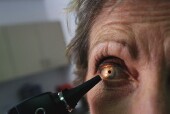No benefit for personalized education, risk assessment performed during ophthalmologic visits
FRIDAY, May 22, 2015 (HealthDay News) — For patients with diabetes, personalized education and diabetes risk assessments performed during retinal ophthalmologic visits do not result in improved glycemic control, according to a study published online May 21 in JAMA Ophthalmology.
Lloyd Paul Aiello, M.D., Ph.D., from Harvard Medical School in Boston, and colleagues examined whether point-of-care hemoglobin A1c (HbA1c) measurement and personalized diabetes risk assessments performed during retinal ophthalmologic visits improve glycemic control. Investigators from 42 sites were randomized to provide study-prescribed augmented diabetes assessment and education or usual care. Participants were adults with type 1 or 2 diabetes who were classified according to the frequency of follow-up care: those receiving a more-frequent-than-annual follow-up (502 control and 488 intervention participants) and those receiving annual follow-up (368 control and 388 intervention participants).
The researchers found that the mean change in HbA1c was −0.1 and −0.3 percent, respectively, in the control and intervention groups at one year (P = 0.35) among participants with more-frequent-than-annual follow-up. The mean change in HbA1c was 0.0 and −0.1 percent, respectively, for the control and intervention groups (P = 0.63) at one year among the cohort with annual follow-ups. Similar results were seen for all secondary outcomes.
“These data suggest that optimizing glycemic control remains a substantive challenge requiring interventional paradigms other than those examined in our study,” the authors write.
Several authors disclosed financial ties to the pharmaceutical industry.
Copyright © 2015 HealthDay. All rights reserved.








